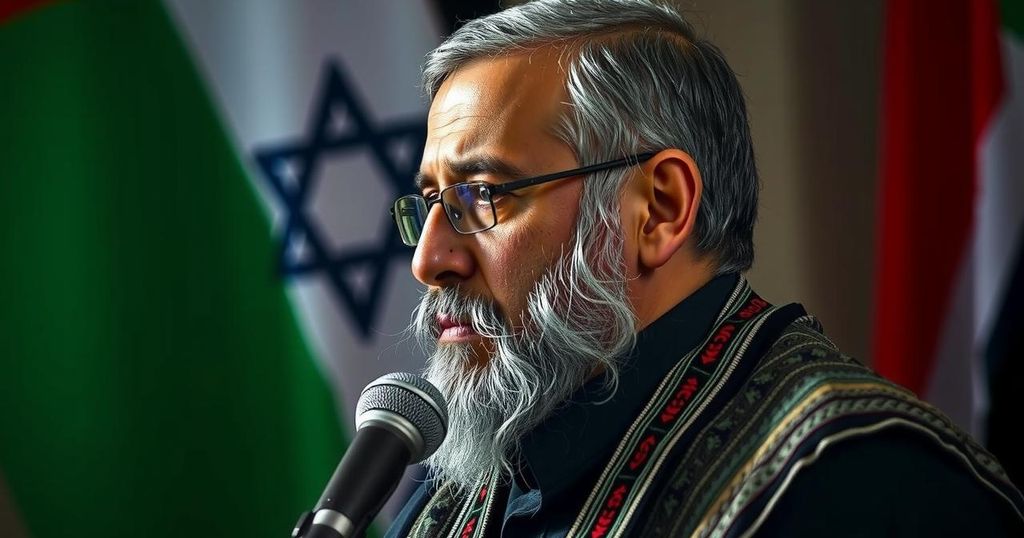Israeli forces confirmed the death of Yahya Sinwar, the head of Hamas’ political bureau and a key architect of the October 7, 2022, attack on Israel. His elimination is seen as a potential turning point in the conflict, with U.S. officials believing it could facilitate a resolution. Sinwar, who had previously expressed skepticism about further war, has been a controversial figure, deeply entwined in Hamas’ military strategy and political dynamics. The ongoing humanitarian crisis in Gaza remains a critical concern as international calls for a ceasefire grow louder.
On Thursday, Israel confirmed the death of Yahya Sinwar, the new head of Hamas’ political bureau and a key figure believed to have orchestrated the October 7, 2022, assault on Israel, marking a significant milestone in the ongoing conflict between Israel and Hamas. The Israeli Defense Forces (IDF) and the Israel Security Agency announced they were verifying whether Sinwar was among three militants killed during IDF operations in Gaza. Shortly thereafter, confirmation of Sinwar’s elimination was provided by the IDF. Senior U.S. officials have noted that Sinwar’s death could serve as a “biggest potential game-changer” in the conflict, with hopes that it might lead to an end to hostilities between Israel and Hamas. Sinwar ascended to the role of Hamas’ political bureau head just one week following the assassination of another top Hamas leader, Ismail Haniyeh, in Tehran—a killing attributed to Israel. Sinwar, 62, grew up in the southern Gaza Strip and joined Hamas in the late 1980s, quickly rising to prominence as the founder of the group’s intelligence unit. He was sentenced to four life sentences in 1989 for the abduction and murder of two Israeli soldiers but was released in 2011 as part of a significant prisoner exchange that also freed Israeli soldier Gilad Shalit. Since his release, Sinwar has participated in numerous conflicts with Israel, notably during an 11-day conflict in May 2021 that saw extensive exchanges of fire. In 2015, the U.S. State Department designated him as a global terrorist and he has faced sanctions from both the U.K. and France. Sinwar became Hamas’ Gaza leader in 2017, known for his hardline stance, and was reelected in 2021, shortly before another round of hostilities. He frequently criticized Mahmoud Abbas, the Palestinian Authority head, pledging in a 2022 speech to “ignite resistance in the West Bank,” asserting that he would confront Israel with “rockets” and a united front of supporters. Despite being perceived as a key figure within Hamas, experts indicate that the organization operates within a decentralized framework, suggesting Sinwar was part of a collective leadership that executed strategic military operations. The ongoing conflict flared after the October 7 assault by Hamas, which resulted in approximately 1,100 fatalities in Israel. The subsequent Israeli military response has led to a significant humanitarian crisis in Gaza, with thousands of casualties reported. International pressure for a ceasefire has mounted, with the U.S. indicating a potential reduction in military aid to Israel if conditions in Gaza do not improve. Interestingly, Sinwar had expressed reluctance regarding further hostilities with Israel in the past, indicating a willingness to negotiate under certain conditions, which contrasts sharply with the violent escalation witnessed post-October 7.
The situation centers around the complex and longstanding Israeli-Palestinian conflict, particularly the recent escalations following Hamas’ unprecedented attack on Israel in October 2022. Hamas, a Palestinian militant organization that governs the Gaza Strip, has been involved in multiple confrontations with Israel since its inception in the late 1980s. Yahya Sinwar’s leadership role within Hamas marks him as a significant actor in these dynamics, especially given his history of violence and subsequent political maneuvers. His recent elimination could have profound implications on the ongoing conflict, suggesting shifts in both tactical and strategic operations within the organization and its relations with Israel, the U.S., and other nations in the region. Furthermore, the humanitarian crisis resulting from the conflict has spurred international calls for de-escalation and peace negotiations, complicating the geopolitical dynamics further.
The death of Yahya Sinwar marks a pivotal moment in the ongoing conflict between Israel and Hamas, with potential repercussions for both the militant organization and broader Middle Eastern geopolitics. As both Israel and the U.S. explore the implications of this significant casualty, the international community remains focused on the dire humanitarian conditions in Gaza and the need for a sustainable resolution to the conflict. Sinwar’s legacy as a hardline leader adds another layer of complexity to the already fraught situation between Israelis and Palestinians, underscoring the persistent challenges associated with achieving peace in the region.
Original Source: www.forbes.com






